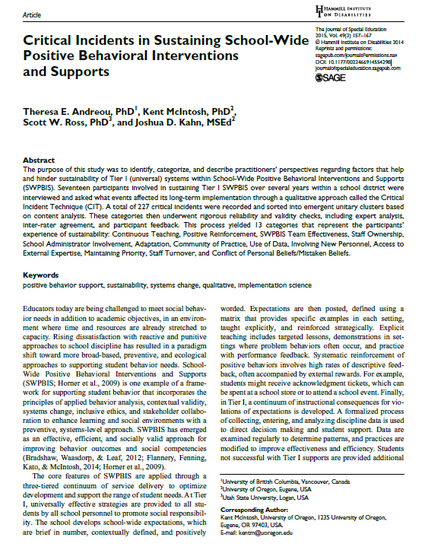
Article
Critical Incidents in Sustaining School-Wide Positive Behavioral Interventions and Supports
The Journal of Special Education
(2014)
Abstract
The purpose of this study was to identify, categorize, and describe practitioners’ perspectives regarding factors that help and hinder sustainability of Tier I (universal) systems within School-Wide Positive Behavioral Interventions and Supports (SWPBIS). Seventeen participants involved in sustaining Tier I SWPBIS over several years within a school district were interviewed and asked what events affected its long-term implementation through a qualitative approach called the Critical Incident Technique (CIT). A total of 227 critical incidents were recorded and sorted into emergent unitary clusters based on content analysis. These categories then underwent rigorous reliability and validity checks, including expert analysis, inter-rater agreement, and participant feedback. This process yielded 13 categories that represent the participants’ experience of sustainability: Continuous Teaching, Positive Reinforcement, SWPBIS Team Effectiveness, Staff Ownership, School Administrator Involvement, Adaptation, Community of Practice, Use of Data, Involving New Personnel, Access to External Expertise, Maintaining Priority, Staff Turnover, and Conflict of Personal Beliefs/Mistaken Beliefs.
Keywords
- positive behavior support,
- sustainability,
- systems change,
- qualitative,
- implementation science
Disciplines
Publication Date
October 20, 2014
DOI
10.1177/0022466914554298
Citation Information
Theresa E. Andreou, Kent McIntosh, Scott W. Ross and Joshua D. Kahn. "Critical Incidents in Sustaining School-Wide Positive Behavioral Interventions and Supports" The Journal of Special Education Vol. 49 Iss. 3 (2014) p. 157 - 167 Available at: http://works.bepress.com/scott-ross/10/
